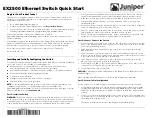
WHAT’S IN THE BOX
In addition to the SLC, the box contains the following items:
PART #
COMPONENT DESCRIPTION
ADAPTERS:
200.2066A
Adapter: DB25M (DCE) to RJ45, Sun w/ DB25 female
200.2067A
Adapter: DB25F (DCE) to RJ45, Sun w/ DB25 male
and some HP9000's
200.2069A
Adapter: DB9M (DCE) to RJ45, SGI Onyx
200.2070A
Adapter: DB9F (DCE) to RJ45, HP9000, SGI Origin,
IBM RS6000, and PC-based Unix/Linux servers
ADP010104-01
Adapter:RJ45 rolled serial,0.1m (0.33 Ft.) for Cisco and Sun Netra
CABLES:
200.0063
Cable: RJ45 to RJ45, 6.6 ft (2 m)
500-153
Cable: Loopback
POWER CORDS:
500-041
For single AC models: one AC power cord
For dual AC models: two AC power cords
083-011
For dual DC models: one accessory kit, each
containing DC plug connectors and instructions
Note: An optional adapter for external modems is also available from Lantronix:
200.2073 Adapter: DB25M (DCE) to RJ45, external modems.
DOCUMENTATION:
CD Case with Quick Start Guide and CD-ROM
containing the SecureLinx Console Manager User Guide.
SYSTEM OVERVIEW
SecureLinx Console Managers (SLC) enable IT professionals to
remotely and securely administer servers and networking equipment.
Leveraging the console or emergency management port built into most
servers and networking equipment, the SLC provides remote access anywhere,
anytime. All that’s required is an available console, AUX, or serial port (RS-232)
on the attached equipment. Using in-band management, you can manage
equipment over the network from virtually any place, using familiar tools like
Telnet or Secure Shell (SSH). Out-of-band management provides access from
a local terminal or through an optional PC card or external modem.
The number of RS-232 serial (device) ports included in the unit distinguishes
the specific model. All models feature two 10Base-T/100Base-TX network
connections (RJ45), two PC card slots, and a dedicated console port.
All models are compatible with a variety of equipment, including:
• Servers • Switches
• Routers • UPS systems
• PBX systems • Telecom switches
This Quick Start Guide explains the basics: how to connect and set up
your unit so it will work on the network; how to set up local users; and how
to access device ports. For more detailed information, refer to the User Guide
on the CD-ROM supplied with this product or on the Lantronix website:
www.lantronix.com
Q u i c k S t a r t G u i d e
S L C C o n s o l e M a n a g e r s
2
W W W . L A N T R O N I X . C O M
3






















